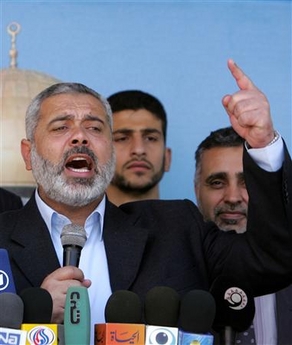Hamas signaled on Wednesday it still had problems accepting Western demands
to recognize Israel and renounce violence, hours after international peace
brokers agreed to channel direct aid to the Palestinians.

Palestinian Prime
Minister Ismail Haniyeh speaks to supporters inside his office in Gaza May
9, 2006. Hamas signaled on Wednesday it still had problems accepting
Western demands to recognize Israel and renounce violence, hours after
international peace brokers agreed to channel direct aid to the
Palestinians. [Reuters] |
The so-called Quartet of international mediators -- the United States,
Russia, the European Union and the United Nations -- decided on Tuesday to send
direct aid for a three-month trial period through what they termed an
international mechanism.
Hamas, a militant Islamist group sworn to Israel's destruction, took control
of the Palestinian Authority in March after defeating President Mahmoud Abbas's
long dominant Fatah movement in parliamentary elections.
This triggered a foreign aid freeze on the new Hamas-led government as major
donor nations and Israel demanded the militant group renounce violence,
recognize the Jewish state's right to exist and embrace existing peace deals.
"The Quartet have conditions. They aim to push the Palestinian government to
make concessions that harm (Palestinian) rights and red lines and give the
(Israeli) occupation legitimacy," said Prime Minister Ismail Haniyeh.
Haniyeh, speaking to reporters in Gaza, did not elaborate but Palestinian
Authority spokesman Ghazi Hamad said a statement would be issued later on
Wednesday in response to the Quartet's decision.
Israel has pledged to act unilaterally and set the Jewish state's borders by
2010 if peacemaking with the Palestinians remains frozen.
Hamas has largely abided by a ceasefire for more than a year but says talks
with Israel would be a waste of time.
Haniyeh said after meeting Fatah officials the two groups had agreed to work
together to end a spate of fighting in the Gaza Strip between gunmen from both
sides.
The violence has been fueled by a power struggle between Haniyeh and Abbas
over control of Palestinian security forces. The clashes have raised fears among
Palestinians of civil war.
In a second day of clashes on Tuesday, 12 people were wounded in gun battles
between Hamas and Fatah members.
"I assure the Palestinian people that dialogue will be the only tool," said
Haniyeh.
Fatah and Hamas said in a joint statement gunmen from both factions would not
enjoy immunity if they were involved in any further clashes.
Abbas said the violence, in which three gunmen were killed on Monday, was
"unfortunate and unacceptable."
The Quartet agreed to channel aid amid warnings by Egypt, Jordan and Saudi
Arabia of civil war if the Palestinian Authority was left to collapse because of
lack of finance.
The method of sending the aid still had to be fully decided on, but U.N.
Secretary General Kofi Annan said it should start as soon as possible.
Senior Abbas aide Saeb Erekat, echoing humanitarian, political and security
concerns expressed by the Palestinian president over the aid issue, told Reuters
the plan did not go far enough.
The Palestinian Authority has been unable to receive funds from abroad
because local, regional and international banks fear sanctions by the United
States, which considers Hamas a terrorist organization.
Abbas appealed in a letter to the Quartet for funds to pay salaries, overdue
since March, to 165,000 workers employed by the Palestinian Authority.
"Besides the potential humanitarian crisis resulting from the general
deterioration of the economic situation, inability to pay salaries might have
deep destabilizing political and security implications," said Abbas.
The United States said any such move would have to be limited in scope and
mechanism so aid would not reach the Hamas-led Palestinian
Authority.